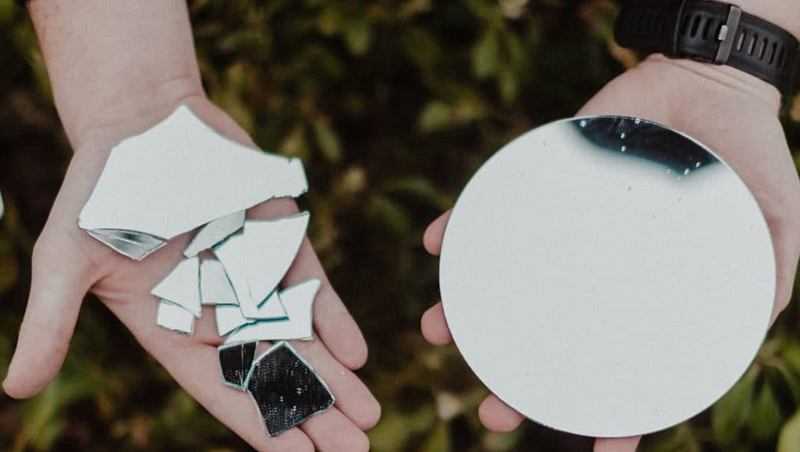
Is Breaking a Mirror Bad Luck?
Breaking a mirror and the associated belief of bringing bad luck and seven years of misfortune is indeed a deeply rooted superstition that has gained prominence across various cultures worldwide. The belief holds that breaking a mirror not only results in immediate negative consequences but also extends its ill effects for an extensive period. However, when it comes to determining the truth behind this superstition, it is essential to approach the topic from historical, cultural, and psychological perspectives.
Is Breaking a Mirror Bad Luck? The origins of this superstition can be traced back to ancient times, when mirrors were uncommon and considered extremely valuable. Mirrors were often made of polished metal or precious materials like bronze or silver, making them expensive commodities. Consequently, when a mirror was shattered, the loss was significant and likely led to financial repercussions. The association between breaking a mirror and subsequent misfortune may have emerged as a means of cautioning people to handle these valuable items with care.
Culturally, the belief in the seven years of bad luck after breaking a mirror has been prevalent in many societies. For instance, ancient Romans believed that the human body went through a renewal every seven years, and breaking a mirror during this period interrupted this cycle, leading to misfortune. In some cultures, it is thought that mirrors serve as gateways to the spirit world, and breaking one disrupts the connection, inviting negative entities or energies into one’s life.
Psychologically, the impact of this superstition can be attributed to various factors. Firstly, the fear of bad luck creates a self-fulfilling prophecy, as individuals who believe they are cursed may unintentionally engage in behaviors that perpetuate or attract unfortunate events. This phenomenon, known as confirmation bias, can reinforce the notion that breaking a mirror causes bad luck. Additionally, the act of shattering a mirror can be distressing and symbolically represents a loss or disruption, leading to feelings of anxiety or unease.
While there is no scientific evidence supporting the idea that breaking a mirror inherently causes bad luck, the psychological impact it can have on individuals should not be dismissed. Belief in superstitions is deeply ingrained in human nature, and the power of belief should not be underestimated. Whether someone genuinely believes in the superstition or not, the fear of negative consequences associated with breaking a mirror can still affect their mindset and behavior.
Cultural Significance of Breaking a Mirror
The superstition surrounding broken mirrors is deeply ingrained in various cultures around the world, not just limited to ancient Romans. Drawing from Greek mythology, we find another fascinating interpretation of this belief. According to Greek legends, mirrors were believed to possess a mystical power that enabled individuals to catch a glimpse of their true selves when looking into them.
In this context, breaking a mirror was seen as a severe disruption or distortion of one’s self-image. It symbolized a rupture in the connection between an individual and their genuine identity. Consequently, it was believed that misfortune and ill luck would befall those who experienced such a disturbance. This belief can be attributed to the idea that mirrors possess a reflection of our soul, capturing our essence in its purest form. Thus, when a mirror breaks, it is thought to shatter the harmonious relationship between the physical and spiritual aspects of a person. This disruption in the mirror’s reflective capabilities creates a sense of vulnerability and invites negative energy into one’s life.
In Chinese culture, mirrors carry significant symbolism and are regarded as powerful tools for self-reflection and the pursuit of truth. The belief in the power of mirrors stems from ancient Chinese philosophies such as Taoism and Confucianism, which emphasize the importance of harmony, balance, and self-awareness.
Breaking a mirror in Chinese culture is seen as an act that disrupts this delicate balance and invites negative energy into one’s life. It is believed to bring forth seven years of bad luck, similar to the superstition prevalent in Western cultures. However, the significance of breaking a mirror in Chinese culture goes beyond mere luck.
The concept of yin and yang, representing opposing yet interconnected forces, is deeply ingrained in Chinese philosophy. Mirrors, with their reflective surface, symbolize the harmonious interplay between these dualistic energies. Breaking a mirror disrupts this equilibrium, creating an imbalance that can manifest in various aspects of one’s life. Moreover, mirrors are associated with purity and clarity. They are believed to have the power to cleanse negative energies and purify the soul. Breaking a mirror is seen as tarnishing this sacred object and diminishing its spiritual efficacy, leaving one vulnerable to malevolent influences.
Despite the lack of scientific evidence supporting these superstitions, the fear of breaking mirrors persists in many societies. The longevity of this belief underscores the deep-rooted human inclination towards symbolism and the desire to maintain a sense of security and harmony in life. Whether one chooses to embrace or dismiss such superstitions, the cultural significance surrounding broken mirrors continues to captivate our imagination and shape our beliefs.
Psychological Impact of Mirror Shattering
When someone breaks a mirror, the fear of impending misfortune may start to consume their thoughts. They may become preoccupied with the idea that their life is about to take a turn for the worse or that they will encounter a series of unfortunate events. This constant worry can lead to heightened levels of anxiety and stress, as individuals are constantly on edge, expecting something negative to happen.
Moreover, the psychological burden of this superstition can create a self-fulfilling prophecy. As individuals experience everyday setbacks or challenges, they may attribute these incidents to the mirror-breaking event. For instance, if they lose their job or face relationship difficulties, they might believe that these misfortunes occurred because they broke a mirror. This attribution reinforces their belief in the superstition, further intensifying their anxiety and self-doubt.
Does breaking a mirror cause bad luck? Rational Perspectives
Despite the deeply ingrained nature of this superstition, many rational perspectives challenge its validity. Let’s examine some common arguments against the belief that breaking a mirror causes bad luck:
The Law of Probability
The notion that breaking a mirror results in seven years of misfortune defies the principles of probability and shouldn’t be taken seriously. It is crucial to approach this belief with a rational mindset, understanding that accidents happen and attributing every unfortunate event to a broken mirror is purely coincidental.
Firstly, the idea that breaking a mirror would have any impact on one’s luck or fortune lacks scientific evidence and logical reasoning. Superstitions like these often emerge from ancient folklore and cultural beliefs, rather than being based on empirical data or rigorous analysis. In the realm of probability and statistics, there is no causal connection between a broken mirror and prolonged misfortune.
Secondly, accidents occur randomly and are not influenced by arbitrary events such as breaking a mirror. Misfortunes are an inevitable part of life, and attributing them solely to a broken mirror oversimplifies the complex circumstances that lead to unfortunate events. Our lives are influenced by numerous factors, including our actions, decisions, and external events, which can all contribute to both positive and negative outcomes.
Furthermore, it is important to differentiate between correlation and causation. Just because some people may experience a series of unfortunate events after breaking a mirror does not mean that the mirror itself caused those events. Correlation does not imply causation. People tend to remember instances where their bad luck followed a mirror break, while dismissing the countless times a broken mirror had no effect on subsequent events.
In light of modern knowledge and critical thinking, the belief in a seven-year curse resulting from breaking a mirror seems more like an unfounded myth perpetuated through generations. It is essential to approach such superstitions with a healthy dose of skepticism and rely on sound reasoning and evidence-based explanations for events in our lives.
Ultimately, misfortunes happen to everyone at some point, regardless of whether they have broken a mirror or not. Understanding that accidents are random occurrences and attributing them solely to superstitions is a fallacious way of thinking. Embracing the principles of probability and critical thinking helps us navigate life with a more rational perspective, rather than being bound by baseless beliefs.
Cultural Variation
Superstitions surrounding mirrors vary significantly across cultures, with some cultures perceiving them as symbols of good luck or protection. This variation suggests that the belief in bad luck from breaking a mirror is subjective rather than universally applicable.
Psychological Resilience
Human beings possess an innate ability to adapt and overcome difficult situations. By maintaining a positive mindset and focusing on personal growth, one can mitigate any perceived negative effects of mirror breakage.
Conclusion
Breaking a mirror may seem ominous due to centuries-old superstitions, but the belief that it causes bad luck lacks concrete evidence. Understanding the cultural significance and psychological impact of this superstition allows us to challenge its validity. By embracing rationality and focusing on personal growth, we can free ourselves from the shackles of unfounded fears. So, the next time a mirror shatters, remember that it’s merely a temporary setback and not an omen of misfortune.

Hey there! I am Salena Snyde, a dream psychologist with over 10 years of experience. I am the primary author of the Dream Meanings section on Impeccable Nest, where I not only share in-depth knowledge about the nature, function, and significance of dreams but also connect with readers through profound articles and quality information. With passion and a diverse knowledge of dreams, I have established strong connections with dream experts worldwide by reading articles and studying leading books on the subject. I believe that the combination of personal insights and sharing from the dream expert community can provide the most profound and comprehensive understanding for everyone.
